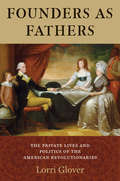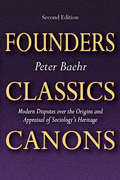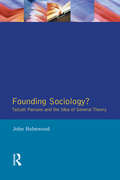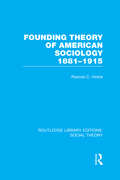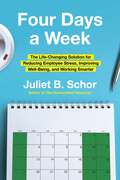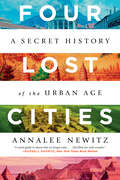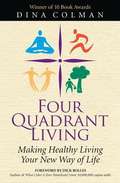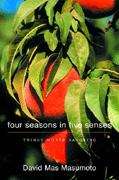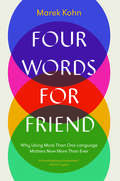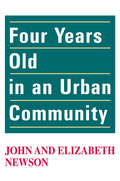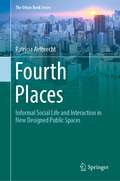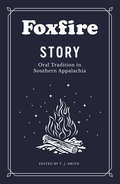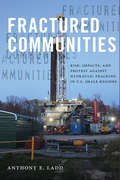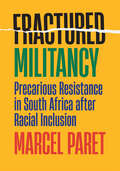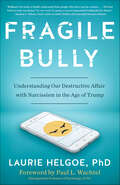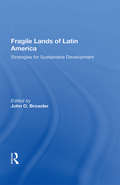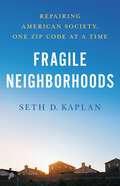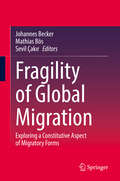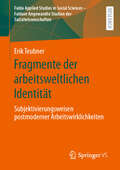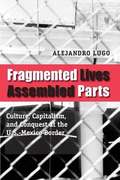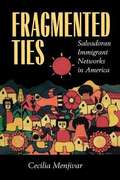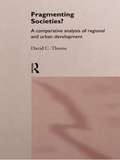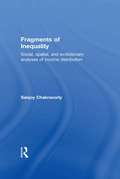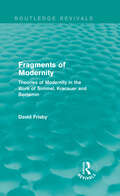- Table View
- List View
Founders as Fathers
by Lorri GloverSurprisingly, no previous book has ever explored how family life shaped the political careers of America's great Founding Fathers--men like George Mason, Patrick Henry, George Washington, Thomas Jefferson, and James Madison. In this original and intimate portrait, historian Lorri Glover brings to life the vexing, joyful, arduous, and sometimes tragic experiences of the architects of the American Republic who, while building a nation, were also raising families. The costs and consequences for the families of these Virginia leaders were great, Glover discovers: the Revolution remade family life no less than it reinvented political institutions. She describes the colonial households that nurtured future revolutionaries, follows the development of political and family values during the revolutionary years, and shines new light on the radically transformed world that was inherited by nineteenth-century descendants. Beautifully written and replete with fascinating detail, this groundbreaking book is the first to introduce us to the founders as fathers.
Founders, Classics, Canons: Modern Disputes Over the Origins and Appraisal of Sociology's Heritage
by Peter BaehrFounders, classics, and canons have been vitally important in helping to frame sociology's identity. Within the academy today, a number of positions�feminist, postmodernist, postcolonial�question the status of "tradition."In Founders, Classics, Canons, Peter Baehr defends the continuing importance of sociology's classics and traditions in a university education. Baehr offers arguments against interpreting, defending, and attacking sociology's great texts and authors in terms of founders and canons. He demonstrates why, in logical and historical terms, discourses and traditions cannot actually be "founded" and why the term "founder" has little explanatory content. Equally, he takes issue with the notion of "canon" and argues that the analogy between the theological canon and sociological classic texts, though seductive, is mistaken.Although he questions the uses to which the concepts of founder, classic, and canon have been put, Baehr is not dismissive. On the contrary, he seeks to understand the value and meaning these concepts have for the people who employ them in the cultural battle to affirm or attack the liberal university tradition.
Founding Sociology? Talcott Parsons and the Idea of General Theory.
by John HolmwoodThe theories of Talcott Parsons' are enjoying a revival in the world of sociology. Rather than following closely the complex original prose in an effort to explain the theory in its minutiae, Holmwood presents a highly readable non-technical critique of several of the strongest underlying sociological themes and shows how, although flawed in many respects, these themes have been recurring, in different forms, in the theories of those critical of his work.
Founding Theory of American Sociology, 1881-1915 (Routledge Library Editions: Social Theory Ser.)
by Roscoe C. HinkleBased on a comparative study of the theories of such sociologists as Ward, Sumner, Keller, Giddings, Ross, Small and Cooley, this is a systematic and rigorous analysis of the main features of earlier sociological theory in the USA. The author identifies and characterizes the basic assumptions of early American sociological thought in terms of an abstract analytical scheme. He shows that early theory focused on social ontological interests, the pervasive ontological stance being evolutionary naturalism, within which the problems of social origins and social change tended to be paramount. He also points out that some sociologists preferred a social process theory. In his final chapter the author suggests the degree of similarity and dissimilarity, of continuity and discontinuity, between earlier and later theory in American sociology, and provides a basis for explaining and interpreting the character of the prevalent assumptions of one period in American theory in relation to other periods.
Four Days a Week: The Life-Changing Solution for Reducing Employee Stress, Improving Well-Being, and Working Smarter
by Juliet Schor ProfessorBestselling author, leading sociologist and economist Juliet Schor makes the case for a four-day work week, persuasively showing how this model can address major challenges such as burnout, AI and the climate crisis, and how employees, companies, and governments can work together to make it a reality. Around the world, long hours and intense pressure are taking their toll. When the pandemic hit in 2020, work-induced stress and burnout skyrocketed. Many reached a breaking point. Now, three-quarters of the world’s employees are disengaged and struggling, including in the US and Canada, where half are experiencing high levels of daily stress.Our current work culture ,the five-day, forty-hours-a-week model—which has gone unchanged for nearly a century—is failing. But a remedial countertrend has emerged: the four-day work week. Kickstarter, Bolt, Basecamp, ThredUp, and hundreds of other employers have eliminated the fifth day of work, successfully figuring out how to maintain productivity while seeing remarkable improvements in employee well-being. Hiring is easier and fewer people are quitting. These results are global. Working a four-day week, people feel energized, capable, and more optimistic about their lives—and their jobs.Four Days a Week is the first large-scale study of this trend. Juliet Schor—an expert who has researched and written about work for more than four decades, beginning with her New York Times bestseller The Overworked American in 1992—shares her pioneering analysis of the benefits of a shorter work week, how companies can achieve them, why the concept has taken so long to emerge and gain acceptance, and why doing so will help a company’s employees and its bottom line. The book is a blueprint for implementing a change that once seemed radical, but is now within reach.
Four Lost Cities: A Secret History Of The Urban Age
by Annalee NewitzA quest to explore some of the most spectacular ancient cities in human history—and figure out why people abandoned them. In Four Lost Cities, acclaimed science journalist Annalee Newitz takes readers on an entertaining and mind-bending adventure into the deep history of urban life. Investigating across the centuries and around the world, Newitz explores the rise and fall of four ancient cities, each the center of a sophisticated civilization: the Neolithic site of Çatalhöyük in Central Turkey, the Roman vacation town of Pompeii on Italy’s southern coast, the medieval megacity of Angkor in Cambodia, and the indigenous metropolis Cahokia, which stood beside the Mississippi River where East St. Louis is today. Newitz travels to all four sites and investigates the cutting-edge research in archaeology, revealing the mix of environmental changes and political turmoil that doomed these ancient settlements. Tracing the early development of urban planning, Newitz also introduces us to the often anonymous workers—slaves, women, immigrants, and manual laborers—who built these cities and created monuments that lasted millennia. Four Lost Cities is a journey into the forgotten past, but, foreseeing a future in which the majority of people on Earth will be living in cities, it may also reveal something of our own fate.
Four Quadrant Living: Making Healthy Living Your New Way of Life
by Dina ColmanLiving healthy doesn't need to be complicated. Four Quadrant Living shows readers how to take responsibility for their own health by providing logically organized and easily implemented ideas and suggestions for nourishing the "four quadrants" of our lives. The book includes ways to reduce stress, live mindfully, eat well, exercise more, sleep better, engage in healthy relationships, and detoxify environments. Many people worry about getting cancer, diabetes, Alzheimer's disease, or heart disease because it "runs in the family." This attitude encourages a passive, out-of-my-hands approach. Instead, Four Quadrant Living offers a new prescription for health, one that emphasizes positive steps readers can take to make healthy living a part of their daily routine. Four Quadrant Living provides simple, effective, and natural ways to help readers take control of their health so that they feel empowered, beat the odds, and live radiantly. We may be eating well and exercising, but we cannot truly be healthy if our mind is stressed, our relationships are toxic, and our world is sick. Every day we make choices that impact our health-the foods we eat, the products we use, the exercise we get, the stress we allow, the people we surround ourselves with, and the environment we live in. Four Quadrant Living guides readers to make healthy living a part of their daily lives, leading to abundant health, vitality, and happiness.
Four Seasons in Five Senses: Things Worth Savoring
by David Mas MasumotoIn our day to day busy schedules we lose sight of the art of living, which for California farmer David Mas Masumoto is also the art of farming. Taking us into his fields to witness the cycle of the harvest, Masumoto reminds us that we must stop living on the run in order to savor the world around us.
Four Words for Friend: Why Using More Than One Language Matters Now More Than Ever
by Marek KohnA compelling argument about the importance of using more than one language in today’s world In a world that has English as its global language and rapidly advancing translation technology, it’s easy to assume that the need to use more than one language will diminish—but Marek Kohn argues that plural language use is more important than ever. In a divided world, it helps us to understand ourselves and others better, to live together better, and to make the most of our various cultures. Kohn, whom the Guardian has called “one of the best science writers we have,” brings together perspectives from psychology, evolutionary thought, politics, literature, and everyday experience. He explores how people acquire languages; how they lose them; how they can regain them; how different languages may affect people’s perceptions, their senses of self, and their relationships with each other; and how to resolve the fundamental contradiction of languages, that they exist as much to prevent communication as to make it happen.
Four Years Old in an Urban Community
by Elizabeth Newson John NewsonAlthough psychologists by training, John and Elizabeth Newson have more aptly been described as pioneers in social ecology; they work from the conviction that the causes and the consequences of child-rearing attitudes can fruitfully be investigated only in the framework of the total social environment in which they occur. This book continues their analysis of child rearing in an English urban setting.
Fourth Places: Informal Social Life and Interaction in New Designed Public Spaces (The Urban Book Series)
by Patricia AelbrechtThis book challenges current views that public life is in decline and that contemporary urban design trends reliant on privatisation, control, events, and thematic designs are to be blamed. Drawing on detailed and extensive analysis of a case study that illustrates well such urban design trends, it shows that informal social life and interaction occur more than its necessary in new master planned environments and new designed public settings, whether public or private owned and/or managed. Furthermore, it reveals the existence of a new category of informal public social settings which it calls fourth places because of their close relationship to Oldenburg’s third places in terms of social and behavioural characteristics – radical departure from the routines of home and work, inclusivity and social comfort – but distinct in terms of activities, locations and spatial conditions – being characterised by spatial, temporal and managerial in-betweenness, i.e. indeterminacy in form, function and times, and a great sense of publicness.The acceptance of these findings problematises well-established urban design theories about master planning, expands existing social theories about the optimal conditions for public social life by empirically and spatially elaborating on them and redefines several spatial concepts for designing public space in relation to the specific dynamics of informal social interaction. More importantly, it brings optimism to urban design practice, offering new insights into designing more lively and inclusive public spaces.
Foxfire Story: Oral Tradition in Southern Appalachia
by Foxfire Fund IncSince 1972, the Foxfire books have preserved and celebrated the culture of Southern Appalachia for countless readers all around the world. In Foxfire Story, folklorist (and Foxfire director) T.J. Smith collects some of his favorite stories from the archives to illuminate the oral traditions that have been part of the culture of the mountains for centuries. Here are instances of mountain speech, proverbs and sayings, legends, folktales, anecdotes, songs, and pranks and jests, along with ghost tales and accounts of folk belief, as well as stories from half a dozen of the region&’s finest storytellers. Through these examples, Smith examines the role storytelling plays in the Southern Appalachian community, identifying the rich traditions that can be found in the region and exploring how they convey a sense of place—and of identity.
Fractured Communities: Risk, Impacts, and Protest Against Hydraulic Fracking in U.S. Shale Regions (Nature, Society, and Culture)
by Peter Hall Stephanie A. Malin Suzanne Staggenborg Anthony E. Ladd Hilary Boudet Sherry Cable Brittany Gaustad James Maples Tamara Mix Carmel Price Dakota K.T. Raynes Stacia Ryder Trang Tran Ion Bogdan Vasi Cameron Thomas Whitley Patricia WidenerWhile environmental disputes and conflicts over fossil fuel extraction have grown in recent years, few issues have been as contentious in the twenty-first century as those surrounding the impacts of unconventional natural gas and oil development using hydraulic drilling and fracturing techniques—more commonly known as “fracking”—on local communities. In Fractured Communities, Anthony E. Ladd and other leading environmental sociologists present a set of crucial case studies analyzing the differential risk perceptions, socio-environmental impacts, and mobilization of citizen protest (or quiescence) surrounding unconventional energy development and hydraulic fracking in a number of key U.S. shale regions. Fractured Communities reveals how this contested terrain is expanding, pushing the issue of fracking into the mainstream of the American political arena.
Fractured Generations: Crafting a Family Policy for Twenty-first Century America
by Allan C. CarlsonFifty years ago, the phrase "family policy" was rarely heard in America. Individual states maintained laws governing marriage, divorce, education, inheritance, and child protection, which regulated the formation, childrearing practices, and dissolution of families. However, these scattered policy issues were not seen as closely related. Until the 1960s, the nuclear family was an institution that was part of the natural life-course expected of most adults. Family meant marriage, children, the establishment of a home, care of the elderly, but perhaps most of all, bonding of the generations.As early as the 1840s, certain elements of states' policies hinted at a weakening family structure, but not until the 1960s was the family openly attacked. Feminists objected to a male-oriented home economy, demographers encouraged negative population growth, the sexual revolution was on the rise, and religiously grounded morality in public life was challenged in the federal courts. Married couples with children had to shoulder a larger tax burden, further discouraging people from building and maintaining families. Perhaps because family was so central to the founders' lives they found no need to mention it in the Constitution. But today, generational bonds have fractured, while family policy is a paramount public concern.As Allan Carlson makes clear no nation can progress, or even survive, without a durable family system. Contemporary family policy represents an attempt to counter the negative forces of the last four decades so as to restore the natural family to its necessary place in American life. Fractured Generations' chapters follow the life-course of the human family--marriage; the birth of children; infant and toddler care; schooling; building a home; crafting a durable family economy; and elder care. This is a passionate and well-reasoned appeal for a return to the institution that is the last best hope for America's future: the family.
Fractured Militancy: Precarious Resistance in South Africa after Racial Inclusion
by Marcel ParetDrawing on extensive ethnographic fieldwork and interviews with activists, Fractured Militancy tells the story of postapartheid South Africa from the perspective of Johannesburg's impoverished urban Black neighborhoods. Nearly three decades after South Africa's transition from apartheid to democracy, widespread protests and xenophobic attacks suggest that not all is well in the once-celebrated "rainbow nation." Marcel Paret traces rising protests back to the process of democratization and racial inclusion. This process dangled the possibility of change but preserved racial inequality and economic insecurity, prompting residents to use militant protests to express their deep sense of betrayal and to demand recognition and community development. Underscoring remarkable parallels to movements such as Black Lives Matter in the United States, this account attests to an ongoing struggle for Black liberation in the wake of formal racial inclusion.Rather than unified resistance, however, class struggles within the process of racial inclusion produced a fractured militancy. Revealing the complicated truth behind the celebrated "success" of South African democratization, Paret uncovers a society divided by wealth, urban geography, nationality, employment, and political views. Fractured Militancy warns of the threat that capitalism and elite class struggles present to social movements and racial justice everywhere.
Fragile Bully: Understanding Our Destructive Affair with Narcissism in the Age of Trump
by Laurie HelgoeObsessive self-promotion, an aggressive triggering response, and retaliatory rants. “Both sensitive and incisive, beautifully capturing the paradoxical dynamic of narcissism—that the grandiosity and surrounding bravado belies an underlying fragility and brittleness.” —Kenneth N. Levy, PhD, Associate Professor, Penn State University; Senior Fellow, Personality Disorders Institute, Cornell University Even before Donald Trump entered America’s highest office, an international survey revealed that narcissism is part of the assumed “national character” of Americans. While only a small number actually meet the criteria for Narcissistic Personality Disorder, those exploitive few have a way of gaining center stage in our culture.Fragile Bully: Understanding Our Destructive Affair With Narcissism in the Age of Trump looks beyond the sound bites of self-aggrandizing celebrities and selfish tweets to the real problem of narcissism. We see past the solo act to the vicious circles that arise in relationships with a fragile bully, and how patterns like this generate both power and self-destruction. We also look at the problem of Echo, how so many of us get hooked by the narcissist, and how variations on the destructive affair leave both partners dehumanized and diminished. Once we recognize the steps in each dance, we can break the cycle and allow and the possibility of true engagement.
Fragile Lands Of Latin America: Strategies For Sustainable Development
by John O. BrowderThis book of selected research papers, originally presented at the "Symposium of Fragile Lands of Latin America—The Search for Sustainable Uses," presents some fresh evidence of the viability of a few "non-conventional" strategies for natural resource development and management.
Fragile Neighborhoods: Repairing American Society, One Zip Code at a Time
by Seth D. KaplanAn &“essential and engaging &” (Richard Florida) exploration of social decline in America: its true causes and the practical steps each of us can take to combat it, starting with the places we call home. The neighborhoods we live in impact our lives in so many ways: they determine who we know, what resources and opportunities we have access to, the quality of schools our kids go to, our sense of security and belonging, and even how long we live. Yet too many of us live in neighborhoods plagued by rising crime, school violence, family disintegration, addiction, alienation, and despair. Even the wealthiest neighborhoods are not immune; while poverty exacerbates these challenges, they exist in zip codes rich and poor, rural and urban, and everything in between. In Fragile Neighborhoods, fragile states expert Seth D. Kaplan offers a bold new vision for addressing social decline in America, one zip code at a time. By revitalizing our local institutions—and the social ties that knit them together—we can all turn our neighborhoods into places where people and families can thrive. Readers will meet the innovative individuals and organizations pioneering new approaches to everything from youth mentoring to affordable housing: people like Dreama, a former lawyer whose organization works with local leaders and educators in rural Appalachia to equip young people with the social support they need to succeed in school; and Chris, whose Detroit-based non-profit turns vacant school buildings into community resource hubs. Along the way, Kaplan offers a set of practical lessons to inspire similar work, reminding us that when change is hyperlocal, everyone has the opportunity to contribute.
Fragility of Global Migration: Exploring a Constitutive Aspect of Migratory Forms
by Mathias Bös Johannes Becker Sevil ÇakırThis book demonstrates the analytical power of the concept of fragility as a central and defining aspect of global migration processes. To this end, the book brings together authors from the Americas, South Asia, the Middle East, and Europe, fostering a global dialogue on the social structuring of migration fragility in and between the Global North and the Global South. The various chapters of the book focus on two aspects. First, it discusses the multiplicity of the migrant as a social figure. There is not just one type of migrant, but a multiplicity of different fragile configurations that lead to the migrantization of people. Secondly, the same applies to the process of migration itself. There is a plethora of different articulations of fragility in crossing borders and organizing a new life somewhere else. Both perspectives show that the fragility of migration is not an aberration from &“normality&”. Fragility is an intrinsic part of the stabilization of social inequalities of migration between different migrants and different countries and regions of the globe. As such, this book is an important resource for researchers and students interested in the study of migration processes.
Fragmente der arbeitsweltlichen Identität: Subjektivierungsweisen postmoderner Arbeitswirklichkeiten (Fulda Applied Studies in Social Sciences – Fuldaer Angewandte Studien der Sozialwissenschaften #1)
by Erik TeubnerSeit dem Zeitalter des Postindustrialismus wird im Rahmen der Erwerbsarbeit verstärkt auf Subjektivität eingegangen. Doch wie beeinflusst Arbeit unser Selbstverständnis genau? Im Zeichen der Arbeitsforschung widmet sich dieses Werk der Aufgabe, verschiedene Facetten der Subjektivierung in der postmodernen Arbeitswelt aufzudecken. In fragmentarischem Stil behandelt jedes Kapitel einen anderen Phänomenbereich: von Zugehörigkeit, Anerkennung und Macht über Intrapreneurship und Sinn bis hin zu Zeit und Humor am Arbeitsplatz. Die jeweiligen Untersuchungen zu diesen Dimensionen von Arbeit eröffnen ein neues Reflexionsniveau für die Arbeitsforschung zur Frage, wie Imperative, Praktiken und Erfahrungen der postmodernen Arbeitswelt die persönliche Identität prägen und verändern. Das vorgestellte Konzept der lebensweltlichen Subjektivierung bietet dabei einen umfassenden Rahmen für eine interdisziplinäre Perspektivierung der Subjektivierungsanalyse, die sich auf Diskursforschung, Praxistheorie und Leibphänomenologie stützt. Dieses Buch lädt gleichsam dazu ein, dialektisch in die vielfältigen Selbstpositionierungen des Arbeitsalltags einzutauchen.
Fragmented Lives, Assembled Parts
by Alejandro LugoEstablished in 1659 as Misión de Nuestra Señora de Guadalupe de los Mansos del Paso del Norte, Ciudad Juárez is the oldest colonial settlement on the U. S. -Mexico border-and one of the largest industrialized border cities in the world. Since the days of its founding, Juárez has been marked by different forms of conquest and the quest for wealth as an elaborate matrix of gender, class, and ethnic hierarchies struggled for dominance. Juxtaposing the early Spanish invasions of the region with the arrival of late-twentieth-century industrial "conquistadors," Fragmented Lives, Assembled Parts documents the consequences of imperial history through in-depth ethnographic studies of working-class factory life. By comparing the social and human consequences of recent globalism with the region's pioneer era, Alejandro Lugo demonstrates the ways in which class mobilization is itself constantly being "unmade" at both the international and personal levels for border workers. Both an inside account of maquiladora practices and a rich social history, this is an interdisciplinary survey of the legacies, tropes, economic systems, and gender-based inequalities reflected in a unique cultural landscape. Through a framework of theoretical conceptualizations applied to a range of facets--from multiracial "mestizo" populations to the notions of border "crossings" and "inspections," as well as the recent brutal killings of working-class women in Ciudad Juárez--Fragmented Lives, Assembled Parts provides a critical understanding of the effect of transnational corporations on contemporary Mexico, calling for official recognition of the desperate need for improved working and living conditions within this community.
Fragmented Ties: Salvadoran Immigrant Networks In America
by Cecilia MenjivarIn one of the most comprehensive treatments of Salvadoran immigration to date, Cecilia Menjívar gives a vivid and detailed account of the inner workings of the networks by which immigrants leave their homes in Central America to start new lives in the Mission District of San Francisco. Menjívar traces crucial aspects of the immigrant experience, from reasons for leaving El Salvador, to the long and perilous journey through Mexico, to the difficulty of finding work, housing, and daily necessities in San Francisco. Fragmented Ties argues that hostile immigration policies, shrinking economic opportunities, and a resource-poor community make assistance conditional and uneven, deflating expectations both on the part of the new immigrants and the relatives who preceded them. In contrast to most studies of immigrant life that identify networks as viable sources of assistance, this one focuses on a case in which poverty makes it difficult for immigrants to accumulate enough resources to help each other. <p><p> Menjívar also examines how class, gender, and age affect immigrants' access to social networks and scarce community resources. The immigrants' voices are stirring and distinctive: they describe the dangers they face both during the journey and once they arrive, and bring to life the disappointments and joys that they experience in their daily struggle to survive in their adopted community. "Menjivar painstakingly describes the 'downside' of immigrant networks. Although there are exceptions in early accounts of the Chicago School of Sociology, nothing similar exists for recent migrants. It is a polished integration of ethnographic research and imagination, not a description of a localized phenomenon. For that reason, this book has significant implications for sociological analysis and it will be read extensively. . . I can imagine it used not only for further exploration of issues of interest to specialists, but also as a tool to instruct students and the wider public about the details of immigrant adaptation."—Patricia Fernandez-Kelly, Princeton University Department of Sociology and Office of Population Research "Framented Ties provides a nuanced and critical analysis of the complexity of immigrant social networks. . . .This astute study of the underside of networks -- and of their differentiation by gender, generation, and social class -- is a gem of an ethnography that will challenge conventional wisdom on the subject. . . .It is an illuminating look at a significant population -- the Salvadorans -- that has almost imperceptibly become one of the largest Latin American groups in the United States."—Ruben G. Rumbaut, co-author of Immigrant America: A Portrait "This is the first book on Salvadorans living and working in California, and it is a treasure. Based on meticulously collected research materials, this ethnography offers one of the most compelling and complex analyses of social networks. Revealing the fluid nature of social networks and the ways in which the intersections of generation, gender and class conspire to both help and hinder Salvadorans' opportunities in the United States, Cecilia Menjivar's book promises to make lasting contribution to the way we think about immigration." —Pierrette Hondagneu-Sotelo, author of Doméstica
Fragmenting Societies?: A Comparative Analysis of Regional and Urban Development (International Library of Sociology)
by David C. ThornsFirst Published in 2004. Routledge is an imprint of Taylor & Francis, an informa company.
Fragments of Inequality: Social, Spatial and Evolutionary Analyses of Income Distribution
by Sanjoy ChakravortyFirst published in 2006. Routledge is an imprint of Taylor & Francis, an informa company.
Fragments of Modernity: Theories of Modernity in the Work of Simmel, Kracauer and Benjamin (Routledge Revivals)
by David FrisbyFragments of Modernity, first published in 1985, provides a critical introduction to the work of three of the most original German thinkers of the early twentieth century. In their different ways, all three illuminated the experience of the modern urban life, whether in mid nineteenth-century Paris, Berlin at the turn of the twentieth century or later as the vanguard city of the Weimar Republic. They related the new modes of experiencing the world to the maturation of the money economy (Simmel), the process of rationalization of capital (Kracauer) and the fantasy world of commodity fetishism (Benjamin). In each case they focus on those fragments of social experience that could best capture the sense of modernity.
